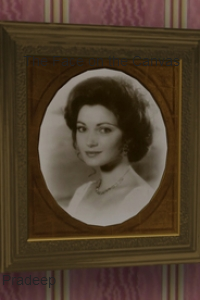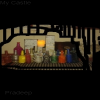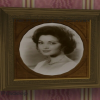
The quest for stories is a passion I have carried with me and this took wings lately. Some time back I had requested a young lady to create a story for our magazine.
She is a prolific traveller and goes for treks at every available opportunity. Most weekends she would find a reason to travel and explore. Recently she had been to the Pauri Garhwal region of Uttarakhand from where she sent me a post card written in Bengali. It read like this ...You have requested me for a story a few times. I never said no to that, though I didn’t quite find time all this while. I thought I will pen a letter to you. I have come to a nameless tiny village of Pauri Garhwal. I am in the midst of a flight of sankhachil (Brahminy Kite) listening to the music of numerous birds chirping and tweeting. Soaking in the sun, I write this letter to keep my promise.
The letter set me thinking. I was amused; a very novel way to elude my request. That evening I coined a name for the nameless tiny village of Pauri Garhwal. Sarapa would be apt I thought.
That evening Sucheta arrived in Village Sarapa, late in the afternoon after an eight hour bus journey followed by a walk uphill for about an hour. Exhausted and tired, she looked around for place to stay at night. She failed; it seemed no lodges were available. One or two tea shops and a few houses with thatched roof were visible. The deserted look made her apprehensive as she went up to a tea stall and asked the rustic looking shop- owner for a lead. The man replied with a stoic face ... iha kuch nahi hai....
Sucheta sat down on the rickety wooden bench of the tea-stall. It was dusk. Even the shop had no clients except an old man sitting alone in the far corner, sipping tea. His white beard was like a shroud. Sucheta looked at him, thought this man could be her saviour and tiptoed near him. The man had his eyes down all this while. It could be a coincidence, as she was near him at arms length, he looked up; his eyes seemed to sparkle. Sucheta recalled all her confidence to ask ... iha aaj ratke liye rahane ka koi jagaha milega. The old man smiled, and then started laughing aloud. It took almost 60 seconds for him to respond ... Sarapa me koi rahane nahi ata ... din me ghumphirke bapas chale jate hai... Iha koi hotel nehi hai.
Sucheta retraced her steps and sat down frustrated. She could not think any more and asked for a cup of tea. After having the concoction, she kept on sitting, drowsy and tired. She closed her eyes and had almost dozed of when she felt somebody was watching her.
She looked up to find the old man watching her intently, standing close. A kind of fear encased Sucheta. She looked for the tea-stall owner. He was nowhere to be seen. The old man kept staring. Her face became pale with fright. Sucheta rose and started moving away and then she heard ... main, Prabhudayal... beta mere saath chalo ... aaj raat mere kutiya me bitalo...subhe bus milega sahar ke liye.
Sucheta had never felt so helpless. Realised, that she had no other option and mumbled ... chaliya.
She followed the old man. After about 20 minute walk downhill, Sucheta could see a small hut with brick wall gleaming in the light of a lone street light in the vicinity. The hut had a thatched roof. The door was ajar. The old man entered asking her to wait.
He came back soon with a lantern in his hand to usher her in. A fairly large room sparsely furnished with a single bed, a rack for clothes and one green bench. An oblong table in the far corner had a primus stove and a few utensils. Sucheta could see that the table doubled up as built in kitchen. A worn out mattress stood on the wall besides a broom and a bucket. The walls were not quite visible in the feeble light of the lantern; seemed vacant and drab. The old man opened the back door and showed her the makeshift wash room. She pulled out the towel and headed for the facility.
Back to the room, feeling fresher after a wash, Sucheta found a cup of tea and some broken pieces of matthi in a paper plate waiting for her. Prabhudayal was busy cooking in the far corner. She had the drink and the matthi gratefully. He looked back stared at her and said ... thora aram karlo ... mai khana banata hu. Sucheta reclined on the bed and closed her eyes. Her mind remained lost in the alien atmosphere; uncomfortable in the quiet surrounding, all alone with an unknown man. When she opened her eyes, Prabhudayal was standing near the bed with a lantern in one hand and an aluminium plate in the other, watching her; his eyelids still and probing. She quickly got up and covered herself with the chunni. He placed the plate on the bed and walked back towards the table where he cooked. The plate had some rice, massor dal in a steel bowl and some pakori. Her hunger overtook her as she ate all without waiting for the man to join in. The old man took his plate and sat on the green bench.
After dinner, Sucheta’s host pulled out the mattress standing on the wall and made a bed on the floor. He also found two blankets, walked up to Sucheta and placed one on the bed, looked at her, softly said… so jao beta ... subhe main bus stop me chor doonga. He walked away from Sucheta and settled down in the bed on the floor. Sucheta felt uneasy at the fact that she had displaced the man from his bed. Too tired to start a conversation she pulled the blanket and lied down.With closed eyes she tried to think about the happenings since her arrival in Sarapa and thanked God that she had found a place to spend the night. She heard a sound breathing heavily. Opened her eyes and looked towards the bed on the floor. The old man was fast asleep, snoring.
Sucheta couldn’t sleep. She kept tossing and turning as minutes ticked away. The still of the dark night, a completely unfamiliar surrounding made her restless. She picked herself up, took out the torch from her rucksack and kept rotating the light on the vacant walls. The white of the walls had turned yellowish. She kept doing that till the beckon fell on the wall on the west side of the room.
A dusty painting hanged there. A bust of a middle aged lady; may be 50. She slowly walked towards the canvas. A closer look brought a sensation down her spine. A familiar face was before her. She tried to probe; where on earth had she seen that face. She couldn’t recall. Kept looking at it for a while and then slowly returned to her bed. She kept trying to remember but just couldn’t connect. Bewildered, she closed her eyes.
Sucheta woke up in the morning with a heavy head. Prabhudayal was already dressed standing near the table working on the morning tea. She walked out through the back door to the wash room.
She returned back to the room looking lost and confused. Tea was ready; she had it with her head down. Looked at the painting a few times. Thought of asking the old man, but didn’t. Prabhudayal accompanied her till a distance. He said as he parted... yaha se dus minute ka rashta hai ... tum hamare kutia me rahe ... hame achcha laga ... bahut din baad koi mere saath raha ... khus raho. And then he abruptly turned back and walked away before Sucheta could thank him. Sucheta kept watching as Prabhudayal receded away from her.
She trudged uphill towards the bus stop thinking about the face on the wall. It was frustrating for her; unable to fathom why the face was so familiar. At the bus stop she bought the ticket ant sat down on a cement block made for waiting travellers. The Delhi bound bus arrived. The journey back was uneventful except that her mind kept exploring, digging into her gallery of faces. One by one she scanned all faces in her life. They came in visuals one after the other like a slide show. The face she was looking for was not there. She kept wondering; how did that face on the wall in a nameless village of Pauri Garhwal appear so familiar, so close to her heart.
Back home next day by dawn with a kind of turmoil raging within her. She got ready to go to office. After a long day besieged in her search she went for a wash to wipe away the fatigue. Before the wash basin she splashed cold water on her face. Drops trickled down, as she looked into the mirror. A warped image slowly came alive. She got her eyes close to the mirror, wiped her face to see. The image resembled the face on the painting at Sarapa.
About the Author







Comments